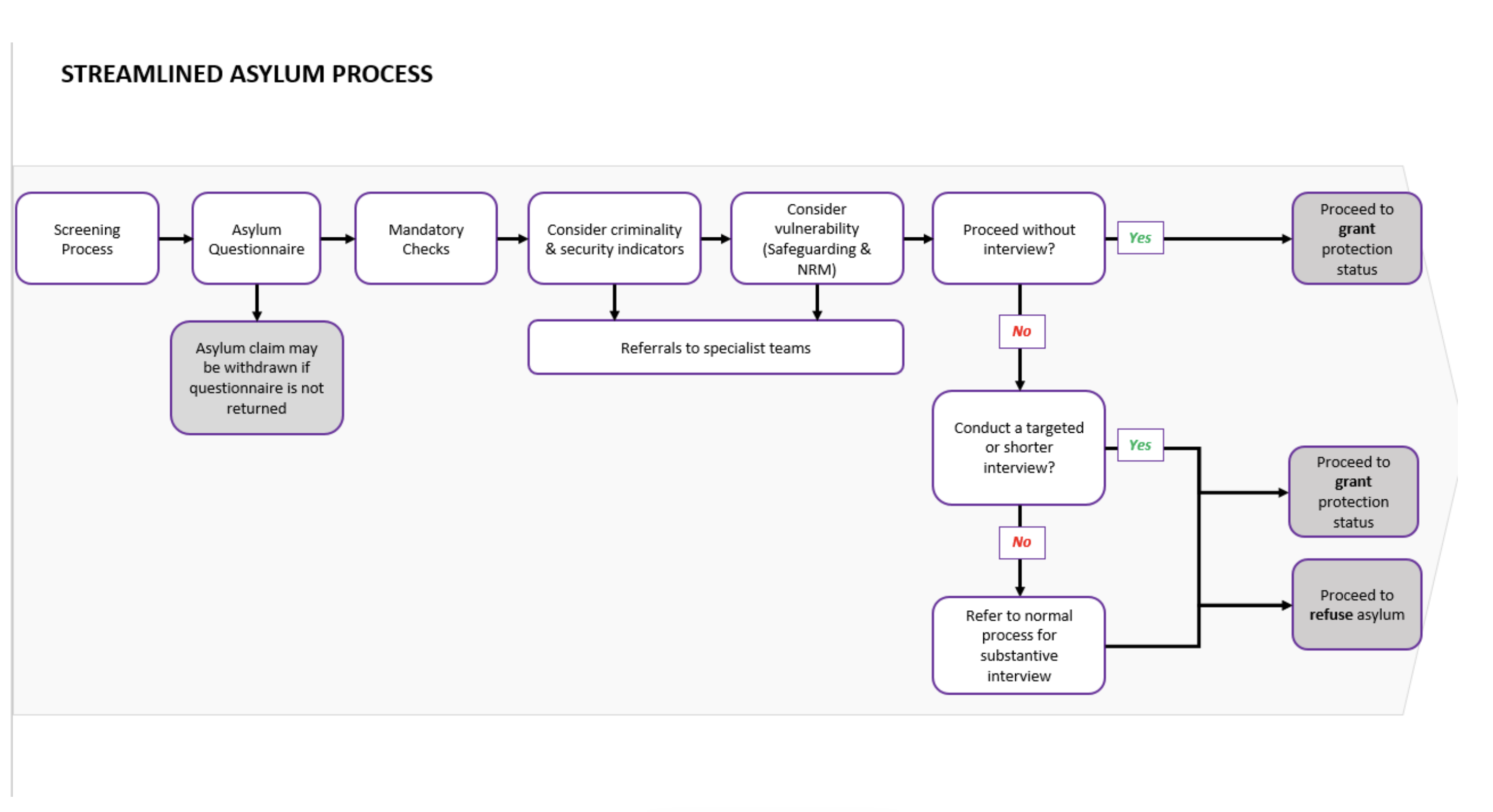- BY Eorann O'Connor

New streamlined asylum process
Quarterly immigration statistics released last week show the asylum backlog has hit a record high as 160,919 asylum seekers await an initial asylum decision, quadruple the number awaiting an initial decision at the end of 2019. In December 2022, following intense criticism over continuous unprecedented delays, Prime Minister Rishi Sunak made a statement to Parliament on the government’s immigration plans. He acknowledged that claims need to be processed “in days or weeks, not months or years” and pledged to radically re-engineer asylum processing, “with shorter guidance, fewer interviews, less paperwork and introducing specialist case workers by nationality”. By implementing these changes the government apparently expects to “abolish the backlog of initial asylum decisions” by the end of 2023.
On 23 February 2023, the Home Office launched a new streamlined asylum processing model, to accelerate the process for certain cohorts of asylum-seekers by allowing decision-makers to grant asylum without conducting an interview. Streamlining will apply only to ‘legacy’ (pre-28 June 2022) claims. In other words, only for individuals who claimed asylum before the Nationality and Borders Act 2022 came into force.
The new streamlining process will concentrate on individuals from Afghanistan, Eritrea, Libya, Syria, and Yemen. These countries have been identified due to their high-grant rates of protection status (over 95%) as a result of the current security and humanitarian situations there. Guidance for Home Office staff notes that this threshold, along with the countries included, is subject to change and will be regularly reviewed.
The guidance reproduces the new streamlined process in diagram form:

Asylum Questionnaire
Claimants identified as eligible for streamlining will be sent an asylum questionnaire which must be completed in English and returned within 20 working days.
A draft asylum questionnaire was leaked by The Guardian and other sources. It is a complicated, 10-page document of over 50 questions which, if not returned, could result in the asylum claim being treated as withdrawn under Paragraph 333C of the Immigration Rules. The document states:
“You do not need to have any knowledge of the asylum system; we only need you to explain why you are claiming asylum.”
Yet the document is the basis upon which a grant of asylum may be made and therefore it is undoubtedly the case that legal advice is required to understand the consequences of completing the form. Especially so, where the burden of proof rests on the asylum-seeker.
The document suggests that those who do not speak, write or understand English can use online translation tools to aid completion of the form, or that a friend who understands English can assist with explaining why the applicant is claiming asylum.
You can read more about the questionnaire here, and how to answer it here.
Charities have welcomed moves to reduce the backlog but warn that the process must be well thought-out and highlight the risk of asylum-seekers missing out on entitlements to protection due to language barriers, lack of legal support and the restrictive deadline.
The British Red Cross said the 20-day time limit could have “devastating impacts” on people who need protection, and that government communications with people seeking asylum often fall short, with translations rarely provided and forms lost in transit.
Freedom from Torture said that requiring people to complete a complex form, often without legal advice, in a language they don’t understand and to a 20-day deadline could see many claims wrongly withdrawn, leaving individuals at risk of return to torture or persecution.
Joint Council for the Welfare of Immigrants described the government’s plans as “clumsy, unthinking and could put people’s safety at risk”.
Language barriers, lack of legal assistance, and the assertion that individuals can potentially rely on friendship to present an accurate and effective asylum claim is concerning. We will be publishing some suggested guidance for completing these questionnaires shortly.
Targeted and shorter interviews
The guidance anticipates there will still be occasions where a personal interview is required and encourages the use of targeted and shorter interviews to ensure claims are considered without delay. However, targeted and shorter interviews can still lead to refusals without the opportunity for the asylum-seeker to undergo a full substantive interview.
Targeted interviews will predominantly be used to ascertain a claimant’s nationality, for example where insufficient evidence on claimed nationality has been provided. These interviews will typically last 30 to 60 minutes and focus on obtaining further information on nationality required for an asylum decision. A targeted interview may lead to a grant of protection status, other form of leave to remain, or refusal.
This is different to a shorter interview.
A shorter interview may be conducted where limited further information is required to ascertain a small number of the claimant’s core material facts. Shorter interviews will involve questions which will help decision-makers assess the credibility of certain fundamental aspects of the claim. This may include, for example, questions about a Convention reason for claiming asylum, such as religion, or a claimant’s journey to the UK. These shorter interviews will typically last up to two hours and may lead to a grant of protection status, other form of leave to remain, or refusal.
Conclusion
In a statement following the announcement of the new streamline procedures, the UNHCR, the UN’s refugee agency, welcomed the measures commenting that removing the requirement for substantive interviews for asylum seekers from certain countries with very high grant rates should meaningfully reduce the current backlog of cases awaiting adjudication.
The UNHCR also noted the importance of asylum-seekers understanding what is required of them and having the opportunity to present their claims fully and accurately.
It is hoped that these new measures will accelerate decisions for many asylum-seekers waiting in limbo for months, if not years. However, where a reactive measure from a department facing immense criticism is rolled out at pace, there are concerns over the potential for injustice, particularly for a cohort navigating complex bureaucratic demands, often without translation or legal support.
